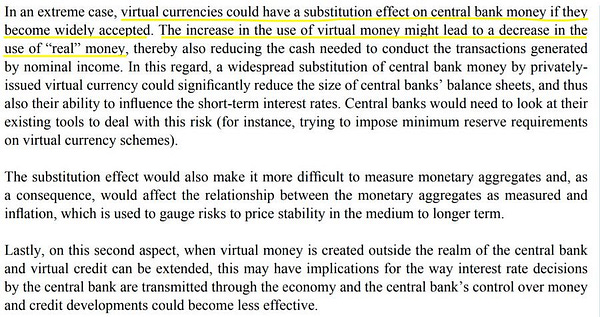Why a Bitcoin ban in the EU is likely - and stupid
The European Union's landmark legislation MiCA in its current form is a positive development, but a Bitcoin ban could still be on the horizon.
Bitcoin is increasingly seen as a ‘dirty currency’. Elon Musk’s Tesla, Wikipedia, Greenpeace, and other organizations stopped accepting BTC for their products or as a means to donate money. Musk, who is not only the richest, but also the most controversial person on this planet, said: “Cryptocurrency is a good idea on many levels, and we believe it has a promising future, but this cannot come at great cost to the environment”. Ouch.
Not only Elon, but also politicians have taken aim at Bitcoin.
Before the MiCA regulation was passed, it caused quite a stir within the Bitcoin community. Especially the left-wing factions in the EU Parliament were opposed to Proof-Of-Work or the power consumption of Bitcoins. In the trilogue, a version of MiCA was finally passed that did not ban PoW or mining. As became known in April 2022, some MEPs tried to push through not only a ban on bitcoin mining but also one on BTC trading in the course of the draft law.
However, the foundations for further steps have been laid. For example, the issuers of cryptocurrencies, which we know are mostly simply tech start-ups, will be obliged to deliver some kind of report on the energy consumption and the associated carbon footprint of the respective asset. Brokers and exchanges, in turn, must inform their customers about these exact figures when they purchase crypto assets.
The increasing aversion to Bitcoin also gained traction through an anti-Bitcoin Greenpeace campaign launched in March, which was financed by Ripple co-founder Chris Larsen, among others. Interestingly, Greenpeace accepted Bitcoin donations between 2014 and 2021 until they were put on hold due to environmental concerns.


Nearly half of the EU parliament doesn’t like Bitcoin
As mentioned, a mining or trading ban for Bitcoin didn’t make it into the MiCA legislation. However, it is very unlikely that members of the EU parliament who tried to implement this in MiCA will give up, we can assume the contrary.
In March 2022 the ECON committee in the EU parliament voted against a ban on PoW. 31 members voted against it, 23 in favor. The topic seems to become more and more ideologically driven, as the Social Democrats, the Greens, and the Left mostly wanted a PoW ban, whereas the Conservatives, the Liberals, and Right-Wing factions tended to vote against it.



The final MiCA draft created by conservative MEP Stefan Berger included a compromise: Instead of a ban on PoW, they agreed on including a rating system for cryptocurrency to assess their environmental impact (more on that later).
In an email conversation with Politico, the Spanish Green EU parliament member Ernest Urtasun explained:
“Creating an EU labeling system for crypto will not solve the problem as long as crypto-mining can continue outside the Union, also driven by EU demand. (…) The Commission should rather focus on developing minimum sustainability standards with a clear timeline to comply.”
And he added:
“Ethereum’s recent upgrade just showed that phasing out from environmentally harmful protocols is actually feasible, without causing any disruption to the network”.
The ECB doesn’t like Bitcoin - at all
While we see different opinions on Bitcoin in the European Parliament, the signals we’re getting from the European Central Bank (ECB) are very clear. The ECB is issuing warnings about cryptocurrencies on a regular basis, naming their “exorbitant carbon footprint” as “grounds for concern”.


In July 2022 the ECB singled out Bitcoin in a research article and compared Proof-of-Work to fossil fuel cars while considering Proof-of-Stake as more akin to electric vehicles. Let’s ignore for a minute that this doesn’t make sense, and look at what they wrote in detail:
Public authorities should not stifle innovation, as it is a driver of economic growth. Although the benefit for society of bitcoin itself is doubtful, blockchain technology in principle may provide yet unknown benefits and technological applications. Hence, authorities could choose not to intervene with a view to supporting digital innovation. At the same time, it is difficult to see how authorities could opt to ban petrol cars over a transition period but turn a blind eye to bitcoin-type assets built on PoW technology, with country-sized energy consumption footprints and yearly carbon emissions that currently negate most euro area countries’ past and target GHG saving. This holds especially given that an alternative, less energy-intensive blockchain technology exists.
In general, they believe it’s highly unlikely that the European Union will NOT take action in terms of carbon emissions on PoW-based assets like Bitcoin. The authors of the paper argue that in their view it’s likely that the EU will take similar steps on phasing out PoW as they are doing with fossil fuel cars. Especially that, according to them, an “alternative, less energy-intensive” technology like PoS exists.
“To continue with the car analogy, public authorities have the choice of incentivising the crypto version of the electric vehicle (PoS and its various blockchain consensus mechanisms) or to restrict or ban the crypto version of the fossil fuel car (PoW blockchain consensus mechanisms). So, while a hands-off approach by public authorities is possible, it is highly unlikely, and policy action by authorities (e.g. disclosure requirements, carbon tax on crypto transactions or holdings, or outright bans on mining) is probable. The price impact on the crypto-assets targeted by policy action is likely to be commensurate with the severity of the policy action and whether it is a global or regional measure.”
What will happen next?
In 2025, we will see a rating system for cryptocurrencies according to their environmental impact within the European Union. Think energy labels for fridges or TVs. You can already expect that bitcoin will get the worst classification. This step will essentially be positive for Ethereum, and bad for Bitcoin.
It’s quite unlikely that such a label will scare off investors from buying bitcoin. Especially that the Bitcoin community is saying that the Bitcoin network is not an obstacle, but a solution for more green energy.
Therefore, the Bitcoin mining industry has an incentive to become greener: The fossil fuel analogy in the ECB paper makes no sense. The energy mix of a PoW network like Bitcoin can come entirely from renewable, green sources. Bitcoin can actually serve as a way to immediately monetize energy, as it is already happening with flared gas that would be flared anyway. However, it’s questionable how fast and effective this effort will be to policy makers, especially since fossil energy companies like Exxon are now mining Bitcoin using flared gas.
The authors of the ECB paper are already implying that a higher bitcoin price equals more energy consumption, as more miners will participate. Destroying demand for Bitcoin would hence be an effective solution to bring down the hashrate. At least in theory.
Some additional closing thoughts:
The academic and political consensus seems to point towards something like trying to retire the ‘old’ PoW, and moving towards the ‘new’ PoS standard. Especially since Ethereum’s recent Merge, many bystanders believe that this could also be a viable path for the Bitcoin network. I doubt that and plan to elaborate on that in a future post.
As we’ve seen in different scenarios, banning Bitcoin is hard if not impossible. The Nigerian government tried, failed, and eventually gave up.
It’s quite a while until 2025 and with an energy crisis, increased focus on carbon emission as well as global uncertainty overall, the only thing we can do at this point is to expect the unexpected.
Even if the worst-case scenario happens, and we will see a Bitcoin ban of some sort happens in the EU, I doubt that this will hold forever. Let’s see.
Like what you read? Send this newsletter to a friend, subscribe (if you haven’t yet) and follow me on Twitter.
Photo by Mika Baumeister on Unsplash.
This newsletter reflects the author’s opinion and is intended for educational and entertainment purposes only. Be aware that this newsletter should not be considered investment advice in any way. Investing in Bitcoin and other assets is risky. Please be careful.





Hello Raphael, thank you for the informative article! It does indeed appear that "policy action by the authorities is propable" toward Bitcoin. Though the early history of government responses to Bitcoin can indicate that "banning Bitcoin is hard if not impossible", the past government responses have been isolated. In my view, a coordinated intergovernmental effort, not to ban, but to fully control the Bitcoin network is likely to be the ultimate governmental response. https://davido-davido.medium.com/no-joy-the-coming-complete-governmental-control-of-bitcoin-5830f5fffd5d
I do agree that "Even if the worst-case scenario happens, ... I doubt this will hold forever." Satoshi's idea that money can exist outside of State control, will rise again, and again. The fight for freedom, monetary or personal, is continual from generation to generation. Thanks for this post.